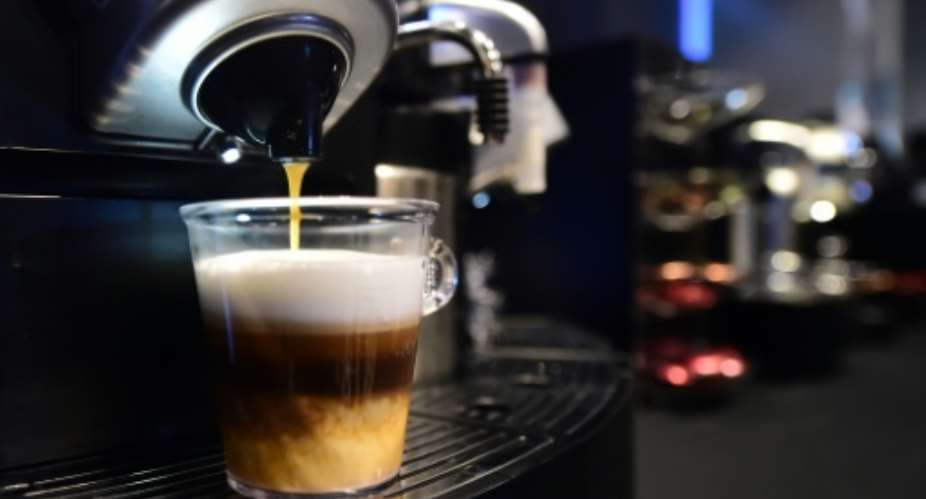Nairobi (AFP) - Mired in civil war for 21 months, its oil-based economy in tatters, South Sudan is an unlikely source of upmarket coffee capsules for European consumers.
But coffee company Nespresso is bringing South Sudanese espresso to the international market for the first time as part of a long-term plan to revive the coffee industry in the poor, war-wracked East African country.
Hollywood actor George Clooney –- an advocate for South Sudan and the public face of the Nespresso brand -– launched the initiative two years ago. "There is a real opportunity here," Clooney said in July 2013.
Five months later a fresh civil war erupted, with tens of thousands killed since, more than two million uprooted and four million pushed to the brink of starvation as fighting continues despite an August peace agreement.
In the meantime, Washington-based non-profit company TechnoServe, tasked by Nespresso to work on the scheme, continued its efforts to breathe new life into South Sudan's coffee industry.
"We wanted to help smallholder farmers have a business opportunity around the existing coffee, to switch the thinking from, 'I've got a couple of coffee trees in my yard,' to, 'I can really work on this and make a living'," said TechnoServe chief executive William Warshauer.
The $2.6 million (2.3 million euro) scheme has seen 300 smallholder farmers sign up to join cooperatives so far with another 1,000 waiting to join. Hopes are to get 15,000 farmers onboard over a 10-year period.
South Sudan is a new exporter of coffee but not a new producer. However, its nascent domestic industry, aimed at local consumption, was destroyed -- like much else -- during decades of civil war during the 20th century.
Wild Arabica coffee still grows on the high, misty Boma Plateau, close to Ethiopia -- where the bean is thought to originate. Wild Arabica and farmed Robusta are both found in the tropical Imatong Mountains to the south.
Robusta is also farmed in fertile Central Equatoria, which has so far avoided the ravages of the civil war that began when President Salva Kiir accused his former deputy Riek Machar of plotting a coup.
- Coffee amid conflict -
TechnoServe works with smallholder farmers around the world to improve their crops and yields, connect them to markets and increase their income. Rarely, though, does the company find itself in a war zone.
"Some of the challenges we faced in South Sudan were common, and some were unique," said Warshauer. "Civil unrest is something we encounter infrequently."
Security concerns forced TechnoServe's foreign workers to pull out for most of last year, slowing the project down.
Warshauer is optimistic however that the harvest at the end of 2015 will be "multiples" larger than in previous years. "Coffee could be the second biggest export outside of oil," he said.
The coffee growing cooperatives around the town of Yei have replanted their trees and yields have improved, as has the quality of the beans thanks to new "wet mills" installed to process the beans on site before export.
The result is a limited edition Nespresso capsule coffee called "Suluja ti South Sudan" ("Beginning of South Sudan" in the local Kakwa language), which is being made available "in extremely limited quantities" to customers in France only, for now.
"We are excited about the potential of this project for economic growth in the region," said Jean-Marc Duvoisin, chief executive of the Swiss-based coffee company.
South Sudan's economy relies almost entirely on oil production which has been severely hit by the conflict and the global oil price collapse, with production falling by a third to around 150,000 barrels per day.
At the same time the value of the South Sudanese pound has plummeted from three to 16 to the dollar while inflation has soared close to 60 percent.
Coffee exports could help diversify the economy, once it emerges from war.
For now, getting any coffee out at all is nigh on a miracle in a country at war with itself.
"We have to be careful not to over-claim," said Daniel Weston, a Nespresso director. "This is the beginning of something not the end, but it has the potential to grow."
Pointing out that his company is a business, not a charity, Weston said, "George Clooney opened the door to the opportunity, but we stayed for the coffee."





 "I can now see clearly with my two eyes, thanks to the generosity of Afenyo-Mark...
"I can now see clearly with my two eyes, thanks to the generosity of Afenyo-Mark...
 Election 2024: Power outages will affect NPP – Political scientist
Election 2024: Power outages will affect NPP – Political scientist
 NPP is 'a laughing stock' for luring 'poster-stickers', 'noisemaking babies' wit...
NPP is 'a laughing stock' for luring 'poster-stickers', 'noisemaking babies' wit...
 Dumsor: Matthew Opoku Prempeh must be removed over power crisis – IES
Dumsor: Matthew Opoku Prempeh must be removed over power crisis – IES
 PAC orders WA East DCE to process requests from their MP
PAC orders WA East DCE to process requests from their MP
 Defectors who ditched Alan’s Movement to rejoin NPP were financially induced – A...
Defectors who ditched Alan’s Movement to rejoin NPP were financially induced – A...
 Dumsor: Akufo-Addo has taken Ghanaians for granted, let’s organise a vigil – Yvo...
Dumsor: Akufo-Addo has taken Ghanaians for granted, let’s organise a vigil – Yvo...
 April 23: Cedi sells at GHS13.66 to $1, GHS13.07 on BoG interbank
April 23: Cedi sells at GHS13.66 to $1, GHS13.07 on BoG interbank
 GRA clarifies tax status of resident individuals earning income abroad
GRA clarifies tax status of resident individuals earning income abroad
 2024 elections: NDC to officially unveil Jane Opoku-Agyemang as running mate tom...
2024 elections: NDC to officially unveil Jane Opoku-Agyemang as running mate tom...
